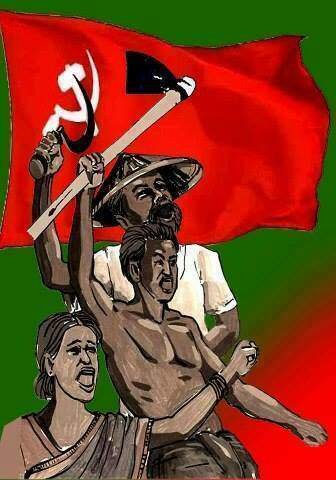In our country there is no mass organization of revolutionaries. Party's Awami League, BNP, etc., for the sake of politics of the big wealthy, kept the organization organized in the name of farmers, which do not represent any interest to the peasants. On the other hand, some NGOs organize the peasants, for the purpose of keeping them away from the social change revolution in the interest of the farmers. Outside of them, the peasant organizations under the leadership of the Left Party Party are the demand-dawa-based reformist farmer organization. Organizations that highlight only some of the demands for not bringing a revolutionary program to the overall liberation of the peasants.These organizations are managed by keeping the city in the center. For that reason, after the Tebhaga-Hajong rebellion, there was no peasant movement based in rural areas based on the isolation of the peasant movement under the leadership of Maulana Bhasani.
"Krishak Mukti Sangram" has been formed to keep the overall release of the farmers in the center. Our goal is to develop rural centrally organized peasant organizations and peasant movements. Those who must be associated with the city, but the foundation of which is village, and rural centric management. For this reason, this organization's office will have to be developed village-based than the upazila-district headquarters. The organizers will also work mainly on the basis of peasantry in the villages and interact with the people.Already in the rural areas of the country, the primary types of channels / connections / organizational structures of our organization have been developed among the peasants. Somewhere somewhere in the developing world, it has been facing many different types of problem questions about how to get ahead of it and it is being done. There are some issues keeping in mind these problems.
■ Our organizers try to come forward on the basis of the urgent demands of the practice of practice in the country while organizing the peasants. It is easy to explain to the peasants. There is also some development of the organization. But then it continues to rotate in the same circle. It is not possible to get out of this circle without bringing new revolutionary politics, ie, the overall release program of the peasants.■ The socio-economic condition of our country, the agricultural situation is not in the local local-based feudal system. On the other hand, it has not been developed as an independent capitalist system. Here the imperialism-based agricultural production system has been developed. As a result, the fruits of the labor of farmer are being collected in different ways and different types of armaments - imperialism - expansionism and their brokers are being deposited in big wealthy homes. Its share is being shared by the Mofussil-centric agents, who are working as the local economic and political foundation of the system.
The imperialism-based production system, how to interfere with our peasants and the real development of agriculture, to work among the peasants, they have to be analyzed and to get rid of the program. Farmers should understand that due to the cultivation of modern methods due to the cultivation of more crops than before, the farmers can not afford to sell their produce and sell the produce.In this case, our organizers are unaware of the question of political control of imperialism-expansionism, but at the same time the economic system created from this, and the question that the counter revolutionary economic program will bring to the question, does not come in the right way, or the fact is less.
Analyzing how the entire agricultural production system has been made imperialism dependent in the name of development of the peasants. The revolutionary agricultural program will have to be demonstrated on how to break down this production system.
In areas which have developed farming techniques such as eyebrows, tobacco, fisheries, shrimp, they have to carry out specific programs by analyzing them.
Khas Zammi distributed among real landless people, "land for farmers' only" - Based on this policy, revolutionary land reforms, ownership or rights of wetland fishermen, to reduce the exploitation of interest, to eradicate the exploitation of the interest, to evict the lease system and to highlight anti-feudal programs.Apart from the indigenous peasant population in the plains and hills, people who used to own land / Bhatbari for years, they have to show that they have not been given ownership. Organizations will be formed in what process? What will be its structure?
In this case, there is a tendency to follow the existing administrative structure. Our organization is completely new kind. So, the process of building this organization and the structure is also new. First 3/5/7 .... The group will have to learn the new politics by forming a group. Then the steps for the formation of the committee can be taken. That committee will be creative coordination
In addition to forming a large number of areas of the peasantry across the country, there will be a continuous and expanding farming area in some areas. It is necessary to develop a constant organizer for coordinating these areas.
Public-minded people became active in the process of development of organization-struggle. To address this problem, youth and youth farmers will have to look into the formation of peasant self-defense groups.
Here are just some points of attention. Organizations should discuss mutual exchange and ongoing discussions and discussions about issues raised from practical practice. In this process, the organized organizational line of peasant movement and peasant movement will be formed. ◘
Source: About peasant problems and peasant organizations, published by peasants Mukti Sangram

Posted using Partiko Android
Nice post